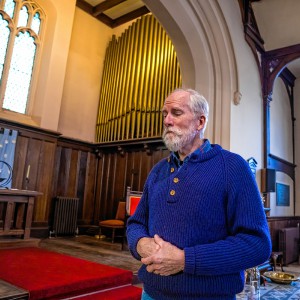Opinion: Meditating on a bitter dock

Photo of bitter dock, an immigrant weed. Jean Stimmell
| Published: 09-14-2024 8:00 AM |
Jean Stimmell, retired stone mason and psychotherapist, lives in Northwood and blogs at jeanstimmell.blogspot.com.
This is a photograph I took of a bitter dock, a common weed in New Hampshire. This one stands as a sentinel at the foot of my driveway. The bitter dock is foreign to our state and, like many other immigrants, is considered to be an invasive pest; however, in the more-than-human world, it is held in high esteem by both birds and animals, who hanker after its seeds.
At first glance, my photograph only captures a moment, as Claude Monet set out to do with his paintings. But his work has become more than that: Revealing a depth revered by people all over the world.
In terms of my own life, my bitter dock picture is equally profound.
When I took this shot, I meant only to document the bitter dock’s colorful autumn garb. But the longer I looked at it, the more memories it brought back, starting when I was a little boy of six. That’s when the loggers came to clear-cut the majestic stand of white pines adjacent to my home, changing the whole ecology of my personal landscape.
Cutting these massive trees opened up a clear view of the sky, inviting in a smorgasbord of sunshine-seeking species, including bitter docks and high-bush blueberries. After a few years, my mother and I were able to go there berry-picking, gaining access to the land through the same gap in the stonewall where the bitter dock now guards my driveway.
It was a different time.
When those white pines were harvested around 1950, timber had monetary value, while land in rural New Hampshire had virtually none. A few years later, this allowed my father to buy the land under the trees for the princely sum of one hundred dollars — land that soon would become mine.
Article continues after...
Yesterday's Most Read Articles
 What to know about the plan to allow students to attend any public school in the state
What to know about the plan to allow students to attend any public school in the state
 ‘If you’re proud of it, we want to see it’: Cars & Coffee on Capitol returning to Concord
‘If you’re proud of it, we want to see it’: Cars & Coffee on Capitol returning to Concord
 ‘A wild accusation’: House votes to nix Child Advocate after Rep. suggests legislative interference
‘A wild accusation’: House votes to nix Child Advocate after Rep. suggests legislative interference
 ‘He went home’: Remembering Rodney Moody, ‘the mayor’ of Concord’s homeless community
‘He went home’: Remembering Rodney Moody, ‘the mayor’ of Concord’s homeless community
 A Franklin congregation loves its 19th-century home. Insurance woes could spell its decline.
A Franklin congregation loves its 19th-century home. Insurance woes could spell its decline.
 High school softball previews: Concord looks to bounce back from heartbreaking exit
High school softball previews: Concord looks to bounce back from heartbreaking exit
Over the years, mixed hardwoods grew back where the pines once stood, gradually shading out the blueberry bushes and restricting the bitter dock to a roadside plant. For the last fifty years, I have shared this land with the maples, oaks, and birches, cutting their wood to feed my woodstove. I am aware that, as a human being, I am so much more of an ecological threat than my little bitter dock plant could ever be.
While many consider this little plant to be a pesky weed, for me, it represents a higher truth. It reminds me of Buddha’s Flower Sermon, a wordless talk he gave to his disciples by holding up a white flower. Only one person understood his message, signaling his approval by smiling.
Within Buddhism, the Flower Sermon signifies the direct transmission of wisdom without words; it is based on first-hand experience rather than rational creeds, intellectualism, or analysis.
The photo I took of this bitter dock is my wordless transmission of this truth: It represents the primordial cycles of nature, grounded in my real-life experience during the short span of my 78 years on Earth.
I honor this wordless transmission by smiling.







 Opinion: An attack on the legal profession is an attack on us all
Opinion: An attack on the legal profession is an attack on us all Opinion: HealthTrust's decision to drop anti-obesity medications is a step back in the fight against a chronic disease
Opinion: HealthTrust's decision to drop anti-obesity medications is a step back in the fight against a chronic disease Opinion: Courage and care count
Opinion: Courage and care count
